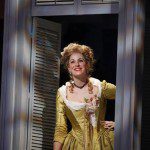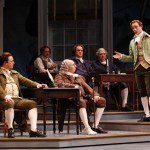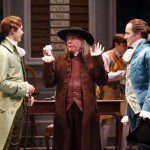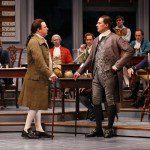‘1776,’ the Musical, Still Tugs at America’s Heart
By • March 22, 2012 0 4310
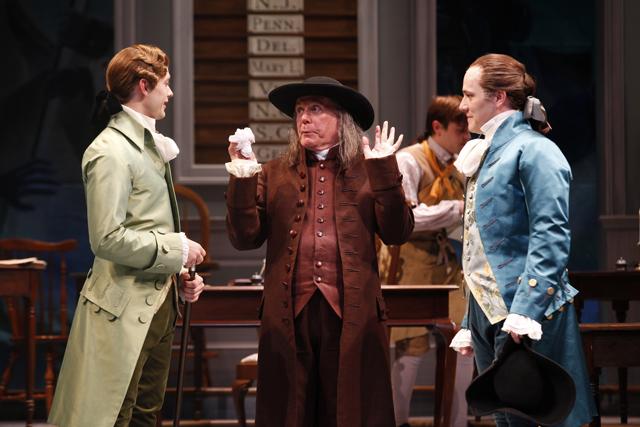
1776. How 236 years ago.
“1776,” the musical. How 42 years ago.
The latest production of “1776,” now at Ford’s Theatre, is playing right during the longest-running reality show in the nation, the Republican Party race for the presidential nomination. How 36 seconds ago.
It is a familiar musical — about how a group of divided, discordant and discomfited bunch of men representing the 13 colonies would eventually come up with the Declaration of Independence in Philadelphia and thus declare themselves a nation of free peoples. It always resonates mightily when performed in the Washington area, even as a high school or dinner theatre production. (We were mindful that it is being staged in the theater where President Abraham Lincoln was shot and performed on the night we attended that the Prime Minister of Britain was being cheered at the White House.)
What’s amazing about “1776,” with music and lyrics by Sherman Edwards and a book by Peter Stone, is that it works at all. The music and songs are to be sure witty, but they’re not in the exalted Broadway musical stratosphere that includes Rodgers and Hammerstein and Stephen Sondheim. It does not strive for anything resembling contemporary pop music styles. The score, songs and lyrics are what they are: they fit perfectly to the needs of the book, a soaring ballad here, a sarcastic, rousing number there, a funny one around the corner, a little bit of this and a little bit of that. And maybe that’s what makes things work, because this has always been a show about the characters in it — by the people, for the people and about the people.
The main purpose of “1776” has always been to give audiences a human look at the men who ended up producing and signing the Declaration of Independence, the visionary heart and soul of American democracy as created then and living through the years and today. Here are the defiant, grimly determined John Adams (“They find me annoying, nobody likes me”), the stolid John Hancock, Thomas Jefferson missing his wife to the point of total distraction (“It’s been six months”), the icily charismatic John Dickinson, defender of property and loyal to the British Crown, the scathing and charming Edward Rutledge, cynical defender of slavery, elderly rock star of the American Revolution Benjamin Franklin and the rum-addled Stephen Hopkins of Rhode Island, to name a few.
In 1776, the Continental Army was short on almost everything — morale, men, organization, weapons and salt peter, awaiting a British assault in New York. The Continental Congress was meeting in Philadelphia where it was a choice between flies and oppressive heat and separation from or reconciliation with Great Britain. That something as historically astounding and resounding as the Declaration emerged from the band of hardly brothers seems in the very least remarkable and in the end inspiring.
Edwards and Stone won Tonys for “1776” but never again matched anything remotely in the way of success of this oddly old-fashioned but also revolutionary show. It’s not a debunking of the legendary names on the declaration, but it surely humanizes the process. We always knew that Adams was an indispensable man here, that Jefferson was young then, in love with his wife, and an all-around genius and that Benjamin Franklin was a genial lech, disliked his royalist son and embraced fame with fervor.
Songs range from show opener “For God’s Sake, John, Sit Down!” to the rousing and funny “The Lees of Old Virginia,” sung with flood-like gusto by Stephen S. Schmidt as Richard Henry Lee, and “He Plays the Violin,” a hymn of praise and prowess in which Erin Kruse, as Martha Jefferson, suggests something more than musical gifts for her husband. “Cool, Cool Considerate Men,” John Dickinson’s praise of pragmatism (“always to the right, never to the left”) presages our battling political parties of 2012, and “Molasses to Rum,” in which Gregory Maheu as Edward Rutledge blasts out an angry, chilling defense of slavery by way of hypocrisy, bring us to the present in one way or another. Everyone gets a say, or a song as it were.
Top acting kudos: Brooks Ashmankis as John Adams, singing with confidence, a man who acts with no limitations but knows his own very well; D.C.’s Shakespearean comic great Floyd King as the semi-sober Stephen Hopkins; Kruse and Kates Fisher as Abigail Adams on the ladies’ side. In particular, one should single out Robert Cuccioli as Dickerson — dressed in dandified black, grey and white, an actor who commands the stages and the audience in every scene. With charisma to spare as well is Maheu, the even more dandified but also shark-like representative from South Carolina, whose embrace of slavery sound like the whispers of the snake in the garden. “They are property,” he sneers, as if that were that.
This great debate in Philadelphia echoes loudly among us, all across the land, by ways of communication these founding signers had never anticipated. When the group agonizes over its deadlock and inability to do anything (“Piddle, Twiddle and Resolve”), they sound like nothing less than today’s Republican and Democratic members of Congress. And with so many presidential candidates, Supreme Court justices and politicians of today claiming intimate personal knowledge of our Founding Fathers, they might be well off checking out this show.
“1776” runs a solid three hours with intermission, but the time and the show passes swiftly. It’s an engrossing production, hugely entertaining and engaging. It plays like a big echo from 236 years ago and from 36 seconds ago.
(“1776” plays through May 19 at Ford’s Theatre.)
- Gregory Maheu as Edward Rutledge, Floyd King as Stephen Hopkins and Steven Carpenter as Dr. Lyman Hall in the Ford’s Theatre production of “1776,” directed by Peter Flynn. | Photo by Carol Rosegg.
- Robert Devaney
- Robert Devaney
- Robert Devaney

